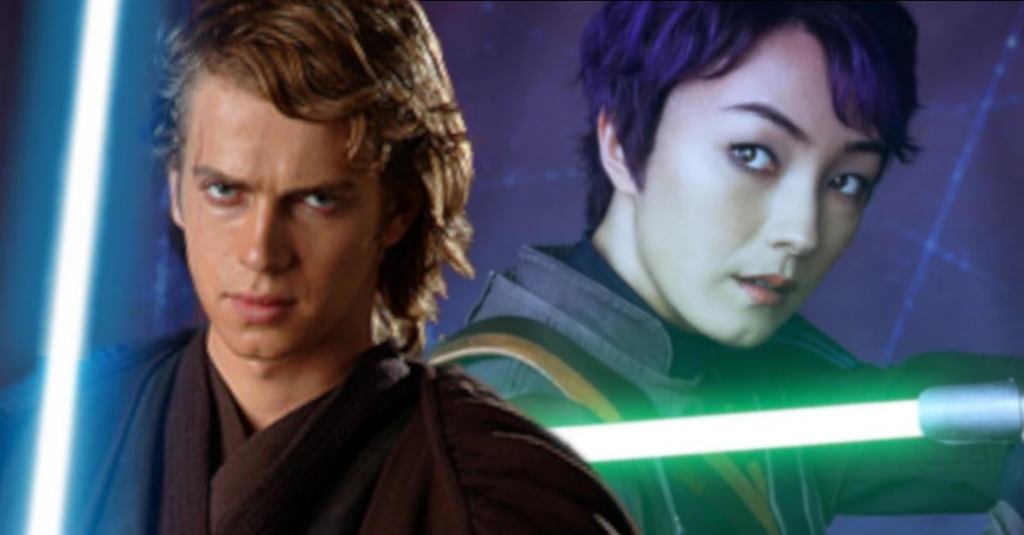Star Wars: Ahsoka has re-sparked a major debate within the Star Wars fandom about the nature and use of the Force. Ahsoka has revealed that Star Wars Rebels heroine Sabine Wren (Natasha Liu Bordizzo) is actually training to be a Jedi under Ahsoka’s tutelage. This was a surprising character turn by Rebels and Ahsoka showrunner Dave Filoni, who established Sabine as a fierce and talented Mandalorian warrior, engineer, and painter. It also raised one immediate question: How can a character that was never shown to be Force-sensitive ever be a Jedi?
Videos by ComicBook.com
Ahsoka Episode 3 opened with a pivotal scene of Ahsoka (Rosario Dawson) and Jedi training droid Huyang (David Tenant) working with Sabine on her lightsaber technique so that she maybe doesn’t get impaled again in their next fight (see: Episode 1). Ahsoka takes things up a notch by making Sabine try the “Zatoichi” technique – i.e., fighting blind while sensing an opponent through the Force. Sabine only shows a moment of breakthrough; when the sparring is over, she expresses her frustrations to Ahsoka (Huyang shares his doubts) but Ahsoka insists there is potential to be tapped, as the Force resides in all living things.
Why Star Wars Having The Force Be Universally Accessible Makes Sense

Star Rebels, Star Wars: The Last Jedi and now Star Wars: Ahsoka have all gotten backlash from some fans for insisting that the Force is something accessible to anyone. However, it’s an idea that makes sense given how Star Wars defines the Force.
George Lucas’ Star Wars Trilogy and its prequels established that the Force is almost like an energy field or lifeforce of the Star Wars Universe. It was a notion clearly inspired by Eastern philosophy and spiritual beliefs, with the Force being most comparable to real-world concepts like martial arts “chi.” Keeping with that metaphor, Jedi were always presented as being like Samurai or Shaolin monks – warriors who draw their strength and power from mastery of chi.
In real life there seems to be an understanding that martial arts students can master their chi to do incredible things like break blocks or endure pain – but that doesn’t mean only those masters can learn such techniques. Martial arts becoming a worldwide practice, with many different types of people mastering different forms of it, is all the proof you need of that.
Turning back to Star Wars: it seems clear now that Dave Filoni is using Sabine’s storyline in Ahsoka to not just settle this debate about the Force with expository explanations – he’s going to show it. Ahsoka is a samurai-themed story, and part of that story shows how a warrior learns the focus and zen-like mindstate to tap into a power she couldn’t access before. It’s a trope that has been, by now, echoed in so many different genres – and if anything, Star Wars is the one franchise besides anime where it fits best.
To be fair: Star Wars itself is responsible for a lot of this confusion. George Lucas was the one who once explained that anyone can use the Force; however, he’s also the one who put out the idea of Midichlorians being the source of Force powers, and Jedi being special people with high Midichlorian counts. However, Midichlorians aren’t the plot armor that prevents other people in the Star Wars Universe from having Force powers: Having high Midichlorian counts, or Force sensitivity (or whatever you want to call it) is like being naturally talented at athletics: while that natural ability (plus dedicated training) means that you may always be the top-tier player on the team, there are always secondary or even bench-warming players that got their spot through harder training to compensate for much less natural ability. The same idea is now being cemented in place in regard to the Force: while the sorts of younglings the Jedi recruited were natural talents, those less sensitive to the Force can still be trained to sense, and presumably, use it.
The Star Wars franchise is continuing to expand, and as many fans are realizing (even reluctantly), there needs to be a wider potential for Jedi-style heroes and dark side villains to appear in the franchise. The story of the Skywalker Saga and its bloodlines of destiny was a good entry point and foundation, but if we continue to venture into eras where Jedi and/or Sith had abundant numbers (The High Republic, The Old Republic), or stories where the Jedi Order has to be built (James Mangold’s First Jedi movie, or the New Jedi Order movie about an older Rey), then actually having precedence for a process of making an “average” person into a Force user is going to be critical. Hopefully, Ahsoka pulls it off in a suitable fashion.
Star Wars: Ahsoka streams new episodes Tuesday nights on Disney+.








